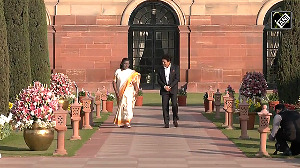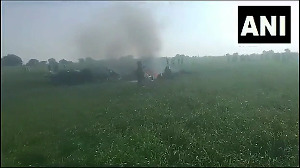Adopting tough measures to prevent hijacking, the government has decided to allow shooting down of an hijacked plane in case there is conclusive evidence that it is being used as a missile like in the 9/11 terror attack.
The anti-hijack policy, cleared by the Cabinet Committee on Security earlier this week, rules out negotiations with hijackers on their demands and makes it clear that talks will only be aimed at preventing loss of life or ending the incident, official sources said.
The CCS gave its approval to fresh proposals by the Bureau of Civil Aviation Security, the Indian Air Force and other agencies to tighten existing guidelines in view of the September 11 terror attack in the US and the Kandahar hijack in December 1999.
The policy, which provides for the death penalty to hijackers, also reduces bureaucratic hassles for getting permission for armed intervention due to shortage of reaction time.
The Indian Air Force has been given the authority to take necessary steps for scrambling fighter jets to guard and guide the hijacked aircraft and force it to land at an Indian airport.
However, a decision in this respect has to be taken by an official of the rank of Assistant Chief of Air Staff (Operations) or above.
After the hijacked plane is forced to land on an airport in India, all efforts should be made to immobilise it and prevent it from taking off, the sources said.
The policy says the decision to shoot down the hijacked aircraft should be taken after it is conclusively ascertained that the aircraft is being used as a missile.
The 'doubtful' nature of the aircraft can be assessed from factors like its deviation from the originally allotted flight path, non-compliance by pilots to instructions given by the Air Traffic Control, switching off of the plane's transponders, no response to radio telephony and aligning of the flight path to a strategic target like VVIP areas or nuclear installations.
The new policy lays down procedures to ensure that National Security Guard commandos, accompanied by a central negotiating team, are airborne within two hours of hijack, the sources said, adding a commercial plane can be used for the purpose in case the IAF or Aviation Research Corps aircraft is not available.
The policy also lays down a detailed coordination chain starting from the ATC to the air force to the Crisis Management
Group till the CCS.
With the CCS giving nod to the policy, mock hijack exercises would be carried out in the near future, the sources said.
Anti-hijack polices have also been tightened by the US, the UK, France and other countries on similar lines following the September 11 terror attack.






 © 2025
© 2025